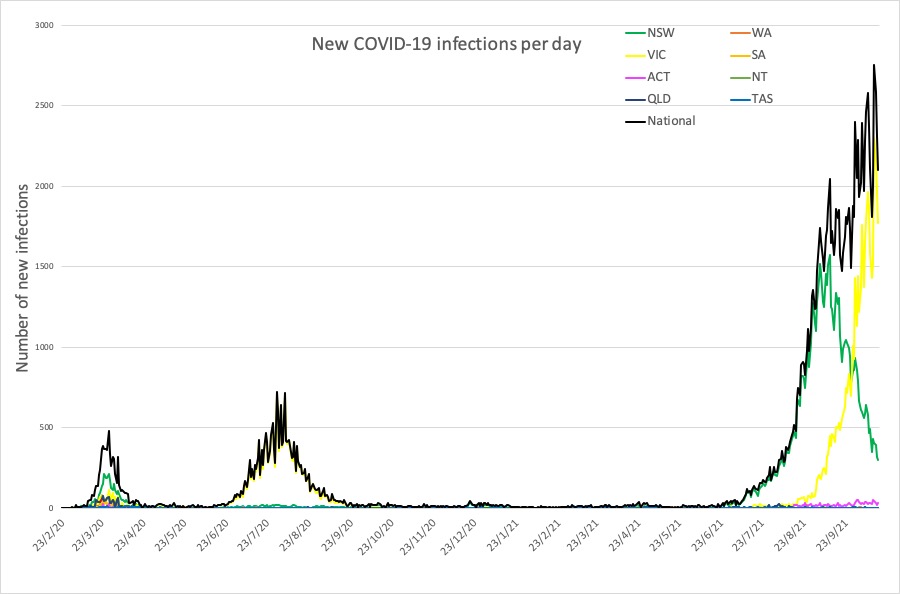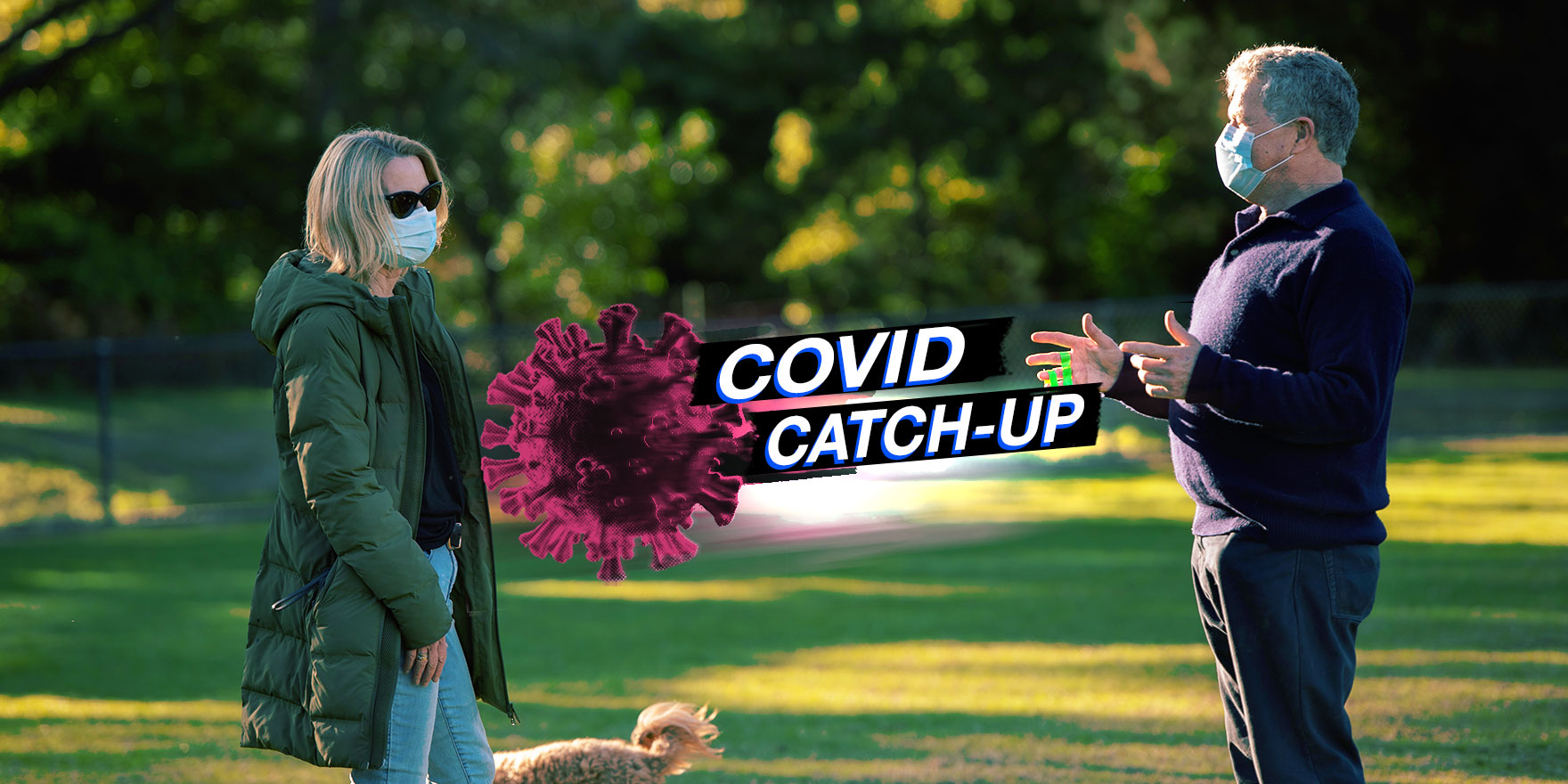And NSW loses access to subsidised telehealth as hotspot status ends.
Welcome to The Medical Republic‘s Covid Catch-Up.
It’s the latest covid-19 news in one convenient post. Email bianca@biancanogrady.com with tips, comments or suggestions.
18 October
- Masks significantly reduce the risk that a close contact will get infected with covid.
- Subsidised telehealth cut as NSW loses Commonwealth hotspot status.
- Monoclonal antibody combination approved to reduce risk of covid disease progression.
- People who use drugs show significantly greater increases in anxiety and depression during pandemic.
- Testing airplane wastewater for SARS-CoV-2 RNA could help screen for infected passengers.
- Latest covid-19 infection numbers from around Australia.
Masks halve the risk of secondary infections resulting from an exposure event, research suggests.
A study published in Emerging Infectious Diseases looked at the rate of covid infections among 969 individuals who were close contacts of a known covid case outside the household, during October 2020 to March 2021 (pre-Delta).
Researchers collected data from each close contact about factors such as whether the index case and close contact were masked, where the exposure event took place, how long it lasted and details about symptoms.
Overall, there were 431 cases among the close contacts. When one or both parties weren’t masked, the secondary attack rate was just over 25%. However this rate was halved when both the index case and close contact were masked during the contact event, and this effect of masks was evident even among school-aged children.
The more time the index case and close contact spent together, the greater the risk of infection: if it was less than two hours, the secondary attack rate was 13.5%, but if it was longer than two hours the risk of infection in close contacts was 25.6%.
“The results from our analysis suggest that proper mask use is very effective for reducing transmission of SARS-CoV-2, lowering the SAR [secondary attack rate] among contacts by half,” the authors wrote, although they noted that the secondary attack rate among all groups was higher than expected.
TMR’s Francine Crimmins reports: GPs in NSW today have lost access to a number of Medicare subsidised telehealth privileges following an announcement at the weekend from Chief Medical Officer Professor Paul Kelly about the removal of the state’s Commonwealth hotspot status.
The announcement came on Sunday as the state reached a vaccination target of 80% in individuals aged over 16 years.
The expiry of NSW as a recognised Commonwealth hotspot means that a majority of patients will no longer be able to access level C phone consults through Medicare.
Under the latest changes, GPs and other medical practitioners can still provide a telephone service lasting at least 20 minutes to any patients in quarantine, isolation or those under state or territory restrictions – which includes any region under a lockdown.
And the conclusion of NSW’s hotspot status also means that GPs will have to be wary of the need for an ‘existing relationship’ with patients they provide telehealth services to. For all telehealth services provided, patients need to have attended at least one face-to-face appointment in the previous 12 months with the treating GP or practice in order to access a Medicare rebate.
Exceptions to the “existing relationship” rule still apply for all sexual and reproductive health items, mental health and eating disorder services, which can be claimed for telehealth consults regardless if a patient has attended a clinic before.
Australia’s drug regulator has approved a monoclonal antibody treatment and prophylaxis for covid in adults and adolescents who are not on oxygen but are at risk of progressing to severe disease.
The TGA has granted provisional approval to Roche’s Ronapreve – which combines casirivimab and imdevimab – to prevent severe disease but also in unvaccinated individuals who have been and are at risk of severe disease but cannot get vaccinated.
The Australian “living guidelines” on covid, from the National Covid-19 Clinical Evidence Taskforce, have been updated to advise that the combination therapy be considered for use in seronegative children and adolescents aged 12 year and over, with moderate to critical disease and who are at high risk of disease progression because of conditions including severe asthma, obesity, and complex chronic conditions.
Anxiety and depression have increased significantly during the pandemic among people who use drugs, a study has found.
Researchers surveyed around 80,000 people who used drugs and nearly 5000 individuals from the general public in two waves: April 2020 and late September 2020.
According to a paper published in the Journal of Affective Disorders, this revealed that the level of general anxiety disorders and depressive disorders were similar between drug users and the general public in the first wave of the survey. However in wave 2 of the survey the frequency of general anxiety disorder had increased 64% more among drug users than among the general population, and the risk of depressive disorder among drug users was double that seen among the general population.
Testing airplane wastewater shortly after arrival could add an extra layer of surveillance for covid cases on board, a study suggests.
Australian researchers tested the wastewater from 37 long-haul flights bringing Australians home, looking for fragments of SARS-CoV-2, according to a paper published in Environment International.
Twenty-four flights were found to have viral RNA in the wastewater, and 24 flights were found to have passengers who later tested positive for covid, despite having a negative RT-PCR test 48 hours before departure.
There were three flights that did not have viral RNA detected in the wastewater yet were later found to have had covid-positive passengers, and three flights had SARS-CoV-2-positive wastewater yet no positive cases reported among passengers.
The authors suggested the discrepancies could be due to passengers with residual viral shedding in their faeces but not in their nasopharyngeal tract, or passengers who were positive but somehow managed to not use the toilet during the entire long-haul flight.
The overall accuracy of the testing was nearly 84%, with the authors proposing that testing of airplane wastewater could be added to clinical testing to help identify infected cases arriving in Australia.
Here are the latest covid infection numbers from around Australia to 9pm Sunday:
National – 143,135 with 1531 deaths
ACT – 1571 (33)
NSW – 71,399 (300)
NT – 225 (0)
QLD – 2017 (0)
SA – 915 (0)
TAS – 237 (0)
VIC – 65,605 (1769)
WA – 1112 (0)



